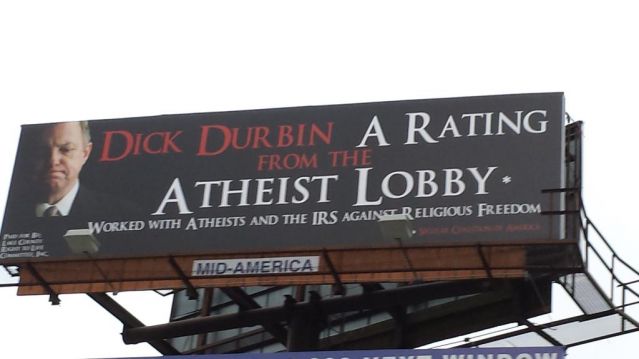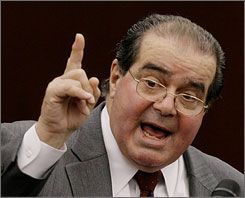Attention
Opponents are Reacting to the 'Atheist Lobby'
Because it's advancing, the secular movement is getting attention
Posted October 4, 2014

Two occurrences last week demonstrate how the growing secular demographic is influencing policy discussion in the United States. Religious conservative backlash is on display in both instances, and can be understood as a reaction to the increased visibility and activism of the secular movement.
In Illinois we see an anti-choice group placing a billboard warning voters that Senator Dick Durbin received an “A Rating from the Atheist Lobby.” The billboard, dark and foreboding, depicts Durbin as a shadowy figure and states that he “worked with atheists and the IRS against religious freedom.”
It’s difficult to envision a similar campaign that so openly disparages a legitimate minority group. Imagine a similar sign warning voters that Durbin received an A Rating from the Jewish Lobby or the Mormon Lobby, for example. There would be outrage, and those placing the ad would be questioned and criticized for their presumptively negative depiction of the group. The outdated assumption in the ad is that Illini voters are so hateful toward atheists that Durbin will lose support just by being associated with nonbelievers. That might have worked in the McCarthy era, but not today.
Indeed, the very fact that there is an “Atheist Lobby” demonstrates the remarkable advancement of the secular demographic in the last decade. The “A Rating” to which the billboard refers comes from the Secular Coalition for America, a coalition of over a dozen atheist and humanist groups from around the country that have joined forces to urge legislators to protect church-state separation and the rights of nonbelievers. A generation ago such a lobby would have been unthinkable, but today it’s a sign of this rising demographic.
The second high-profile anti-atheist swipe came from Supreme Court Justice Antonin Scalia, who told a crowd at Colorado Christian University that nonbelievers are just plain wrong when they expect equality from their government: “I think the main fight is to dissuade Americans from what the secularists are trying to persuade them to be true: that the separation of church and state means the government cannot favor religion over nonreligion.”
It’s not just “the secularists," however, who expect government neutrality on religious matters, a fact that even Scalia concedes as he acknowledges that governing law today requires that “the state must be neutral.” But he then quickly dismisses that current legal standard as badly misguided. “That’s just a lie,” he said.
If we probe a bit, we can see why Scalia is taking the position that the Constitution allows favoritism of religion over nonreligion. After all, if neutrality and equality are required, all the anti-atheist aspects of governmental activity – from “under God” in the Pledge of Allegiance to “In God We Trust” as the national motto (two gestures that are sure to remind atheists that they are second-class citizens) – fail to pass muster.

Scalia is a smart guy, and he can see the writing on the wall. Back when almost all atheists were in hiding and therefore unable to assert their rights as valid citizens – which has been the case for most of Scalia’s life – they could be ignored as government officials pandered to religious interest groups that were largely unopposed in their expectations of favoritism. But now that seculars are actually standing up and demanding to be taken seriously (even promoting visible secularity through efforts such as Openly Secular), it becomes necessary for Scalia and his religious right companions to make the bold claim: religious Americans deserve special treatment as a matter of law, and government should play favorites.
Scalia realizes that this position is intellectually necessary if one wants to advocate for God in government as atheists stand up and demand equality. Many seculars find Scalia’s claim appalling, but we should thank him for honestly defining the issue. As he says, the primary question in today’s culture wars is whether the religious deserve special status over the nonreligious. Many seculars would be happy to answer that question: No, they don’t.
So even if it seemed like atheists were a punching bag last week, it should be some consolation that the punches were thrown as a reaction to successful secular activism. The atheists are coming, and not everyone’s happy about it.
See David Niose’s forthcoming new book, Fighting Back the Right: Reclaiming America from the Attack on Reason




